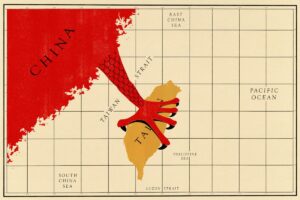
Pic: courtesy internet (foreign affairs)
Recently Beijing sent more than 150 military planes towards Taiwan over four consecutive days amid celebrations of the founding of the People’s Republic of China. These jets (including J-16 fighter jets and nuclear-capable H-6 bombers) entered into Taiwan’s Air Defence Identification Zone (ADIZ), forcing the Taiwanese air force to scramble its jets in response. This was China’s largest-ever incursion into Taiwan’s air defence zone. Taiwan scrambled its jets and deployed AD missile systems against the Chinese ‘air incursion’.
The ADIZ is not the same as Taiwan’s territorial airspace, but includes a far greater area that overlaps with part of China’s air defence identification zone and even includes some of mainland China.
Taiwan
Known formally as the Republic of China (ROC), Taiwan is a self-ruled island that lies about 161 kilometres (100 miles) off the coast of mainland China. It is a democracy with a separate government and a military. But despite its de facto independence, most countries do not consider Taiwan a separate state due to China’s claims over the territory.
Taiwan: History
Taiwan was at one time a backwater of Imperial China. It was colonised by the Japanese during the World Wars. In 1949, the Chinese nationalists fled there after losing a bloody civil war to the communists who established the People’s Republic of China (PRC) with its government in Beijing. In Taipei, the nationalists’ ROC government continued to claim to represent all of China and even held a seat on the United Nations Security Council. But from 1971 onwards, most countries, including the US, began dropping diplomatic recognition of the ROC in Taipei in favour of the PRC in Beijing.
Chinese Claim
Beijing claims the self-ruled island of 23 million as its own and has not ruled out the use of force to achieve its goal of unifying it with China. While Beijing has repeatedly threatened to use force if Taiwan ever formally declares independence, the sabre-rattling has increased under Xi, who sees reuniting Taiwan with mainland China as an issue of legacy. The historical dispute is at the crux of Beijing’s much hyped “One China” principle. Beijing has ramped up pressure on Taipei since 2016.
Taiwan’s Concern
Taiwan feels a threat to its independence, its democracy and its way of life. Taiwan is concerned that China is going to launch a war against Taiwan at some point. Taiwan is resolved to do whatever it takes to defend itself. Taiwan needs to “strengthen itself” and Taiwan President has made modernising the armed forces a priority, enhancing its capacity for asymmetric warfare, so as to make any Chinese attack difficult and costly. Taiwan is looking at smart mines, portable missiles and enhancement of its Air Force capabilities.
Fear of an all-out conflict is growing higher. Some defence analysts predict that Beijing could have the ability to mount a full-scale invasion of Taiwan by 2025.
Taiwan Internal Political Dynamics
Taiwan has the ruling Democratic Progressive Party (DPP), which supports the vision of a Taiwan distinct from China. It also has the more China-friendly Kuomintang (KMT). The KMT is known for fostering closer economic ties with China and is supported by big business interests in Taiwan. The KMT’s more conservative factions, however, continue to call for unification even though that view is now at odds with mainstream Taiwanese society.
US – Taiwan
The United States condemned the Chinese military activity near Taiwan describing it as “provocative” and “destabilising”. US asked China to cease its “military, diplomatic, and economic pressure and coercion against Taiwan”.
While the United States does not have formal diplomatic relations with the island, but is bound by the Taiwan Relations Act of 1979. The legislation mandates the US to “preserve and promote extensive, close and friendly commercial, cultural, and other relations between the people of the United States and the people of Taiwan”.
The United States does not even have a formal defence treaty, but the legislation further obliges the US to make “available to Taiwan such defence articles and defence services in such quantity as may be necessary to enable Taiwan to maintain a sufficient self- defence capacity”.
US is Taipei’s biggest source of military and political support. The US has committed to maintain peace and stability across the Taiwan Strait and within the region. It has promised to “continue to assist Taiwan in maintaining a sufficient self-defence capability”.
China – US – Taiwan
Relationship involving China, Taiwan and the US is a complex diplomatic dance of its kind.
One China Policy. This policy means different things to Beijing and Washington. For the former there is only ‘One China’ and that is governed by Beijing (it is the pretext for its claims that Taiwan is simply a province of the mainland and not an independent state). For the US, however, ‘One China’ is more ambiguous.
China’s Ministry of Foreign Affairs on Monday criticised the US over its ties with Taipei, saying that selling weapons to Taiwan, as well as US ships navigating the Taiwan Strait, was “provocative action that harmed US-China relations.
China has blamed the US for the increased tensions, with the two economic giants at odds over not only Taiwan but other issues including trade, Hong Kong, the situation in China’s far-western region of Xinjiang and the coronavirus.
Analysis
- Actual invasion would be a big challenge for the PLA.
- Recent military activities are an effort at intimidation.
- China is trying to pressure Taiwan and draw some red lines and markers in the sand.
- China is trying to escalate a campaign of psychological warfare against the island.
Bottom Line
Unification of Taiwan with China is the top most priority of China at the moment.
Question
Will US defend Taiwan in case of military invasion by China?
Or
Is Taiwan just a piece on the chess board of world politics?
Coming Up
There is much more to this complex issue.
More on the subject coming up including Indian options.
Suggestions and value additions are most welcome
For regular updates, please register here




